Sie Center’s new speech language pathologist Amanda Seligman
December 2nd, 2014 by Global Down Syndrome Foundation
The Sie Center for Down Syndrome’s new speech language pathologist Amanda Seligman shares important speech development tips for parents of children with Down syndrome.
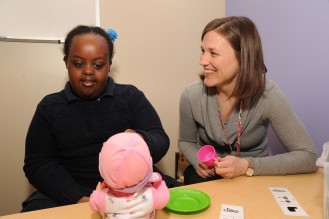 The Sie Center for Down Syndrome at Children’s Hospital Colorado is one of the largest multi-disciplinary teams in the world providing medical care and research for children with Down syndrome.
The Sie Center for Down Syndrome at Children’s Hospital Colorado is one of the largest multi-disciplinary teams in the world providing medical care and research for children with Down syndrome.
Recently, Amanda Seligman, M.A., CCC-SLP, joined the Sie Center as the team lead for speech language pathology. Global sat down with Amanda to learn more.
To make an appointment with Amanda Seligman, please call 720-777-6750.
1. What inspired you to be part of the Sie Center?
2. How did you first get involved in care for children with Down syndrome?
3. Describe your role as a speech language pathologist at the Sie Center.
4. What makes the Sie Center and its multi-disciplinary team so unique?
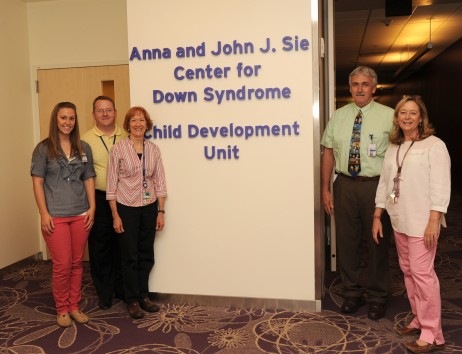
5. What has been the most surprising thing you’ve discovered since starting to work at the Sie Center?
6. What are your hopes for clinical research at the Sie Center?
7. What are your long-term goals for helping improve the lives of children with Down syndrome?
8. What’s the most important thing you think parents of a child should know in terms of speech development?
9. Tell us a little bit about yourself.
Learn more about the Sie Center:
For Vollbrachts, supporting Global is a family investment
December 2nd, 2014 by Global Down Syndrome Foundation
For Bill and Leslie Vollbracht, supporting the Global Down Syndrome Foundation is a family investment in their granddaughter and others who have Down syndrome.
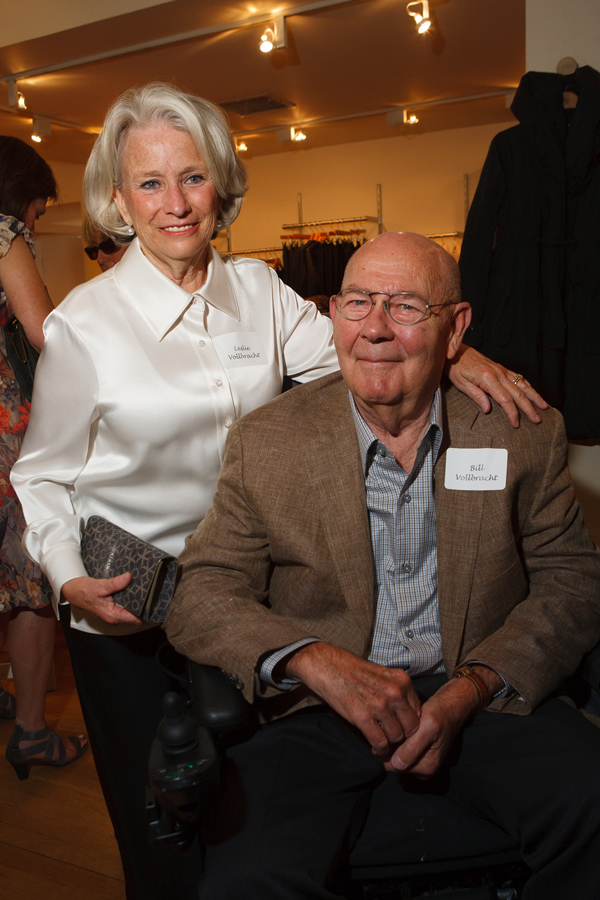 Seasoned entrepreneurs, the Vollbrachts are betting on Global’s research, medical care and outreach. They recently sat down with Global to talk about Colorado, family and why support for Down syndrome medical care and research is so important.
Seasoned entrepreneurs, the Vollbrachts are betting on Global’s research, medical care and outreach. They recently sat down with Global to talk about Colorado, family and why support for Down syndrome medical care and research is so important.
1. You founded and built Land Title Guarantee Company, one of the oldest and most successful title insurance companies in Colorado. What was it like to be a Colorado pioneer?
2. How do you apply your business background to your philanthropic giving?
3. Your granddaughter Katherine Vollbracht Winfield happens to have Down syndrome. How has she changed your lives?

4. How important was the Global Down Syndrome Foundation and the Sie Center for Down Syndrome at Children’s Hospital Colorado for Katherine’s development?
5. How do you feel about your daughter and son-in-law managing the information age, work, children, and becoming advocates for people with Down syndrome?
6. What do you want people to know about Katherine?
7. What is the best thing about being a grandparent?
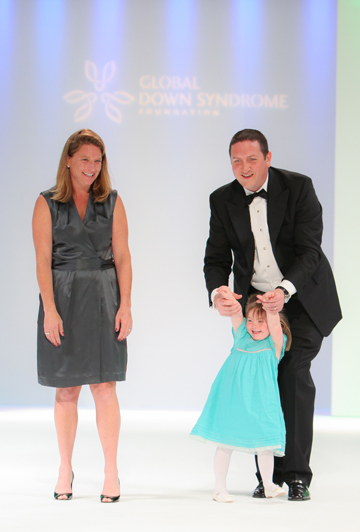
8. You are part of the Leadership Circle supporting Global’s marquee fundraiser and awareness-raiser – the Be Beautiful Be Yourself Fashion Show. Why should people support and attend this event?
9. What is the best advice you were ever given that you would like to pass on?
NIA announces up to $5 million to study crucial link between Alzheimer’s and Down syndrome
October 6th, 2014 by Global Down Syndrome Foundation
The National Institutes of Health (NIH) provides first request for applications specific to Down syndrome–Alzheimer’s disease research — a major step toward addressing the lack of funding for Down syndrome research.
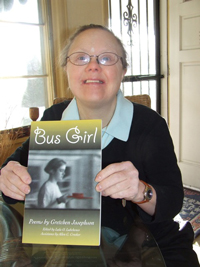 Two institutes under NIH, the National Institute on Aging (NIA) and the Eunice Kennedy Shriver National Institute of Child Health and Human Development (NICHD) recently announced an ROI research grant opportunity called Biomarkers of Alzheimer’s Disease in Down Syndrome. The goal of this funding opportunity is to enable the identification of the longitudinal progression of Alzheimer’s disease in adults with Down syndrome using clinical, cognitive, imaging, genetic and biochemical biomarkers. The $5 million grant opportunity will fund either one or two grants exploring the connection between the two conditions. The application deadline is January 12, 2015.
Two institutes under NIH, the National Institute on Aging (NIA) and the Eunice Kennedy Shriver National Institute of Child Health and Human Development (NICHD) recently announced an ROI research grant opportunity called Biomarkers of Alzheimer’s Disease in Down Syndrome. The goal of this funding opportunity is to enable the identification of the longitudinal progression of Alzheimer’s disease in adults with Down syndrome using clinical, cognitive, imaging, genetic and biochemical biomarkers. The $5 million grant opportunity will fund either one or two grants exploring the connection between the two conditions. The application deadline is January 12, 2015.
Global’s advocacy helps pave the way
In 2006, the Global Down Syndrome Foundation discovered Down syndrome was the least funded genetic condition by the NIH despite being the most common such condition diagnosed in the United States.
To address this, Global worked with the NICHD and co-organized the National Conference on Patient Registries, Research Databases, and Biobanks in December 2010. NICHD continues to address the lack of funding for Down syndrome and has launched an important registry tool called DS-Connect™: The Down Syndrome Registry.
In September 2012, Global and the Alzheimer’s Association organized the first-ever joint workshop bringing top scientists in the fields of Down syndrome and Alzheimer’s disease together. The workshop resulted in three significant milestones: the Down Syndrome–Alzheimer’s Disease Investigator Program which has provided $2 million in grant funding; the “Down Syndrome and Alzheimer’s Disease” Professional Interest Area at the Alzheimer’s Association that keeps research on the two conditions in the minds of decision-makers on funding; and a media spotlight on the relationship between the conditions.
Global’s advocacy efforts in Washington, D.C., has helped put Down syndrome and Alzheimer’s research at the fore. Just last month, Global arranged for Huntington Potter, Ph.D., Director of Alzheimer’s Disease Research at the Linda Crnic Institute for Down Syndrome on the Anschutz Medical Campus to address members of Congress about the importance of Down syndrome research and the potential it holds for treating or curing Alzheimer’s. Dr. Potter is the renowned scientist who discovered the mechanistic relationship between Down syndrome and Alzheimer’s, showing that Down syndrome and Alzheimer’s disease are “two sides of the same coin.”
Global’s collaboration with organizations such as the National Down Syndrome Congress, the National Down Syndrome Society, and the Alzheimer’s Association is driving the new emphasis on Down syndrome–Alzheimer’s research.
The importance of research
“Individuals with Down syndrome have been identified as high risk for developing Alzheimer’s disease,” said Melissa Parisi, M.D., Ph.D., NICHD Chief of the Intellectual and Developmental Disabilities Branch. “We want to know the biological indicators of Alzheimer’s in those with Down syndrome, as well as early signs that suggest the presence of Alzheimer’s disease so we can develop effective prevention and treatment.”
By age 40, almost all people with Down syndrome exhibit the hallmark amyloid plaques and tau tangles associated with Alzheimer’s, but only an estimated 50 percent of people with Down syndrome develop symptoms of dementia by age 50. Studying why this occurs could hold the key to finding a cure for Alzheimer’s.
At the NIA, the grants are part of the federal National Plan to Address Alzheimer’s Disease, which launched in 2012 with a goal of developing effective treatments for Alzheimer’s by 2025.
“The U.S. population as a whole is an aging society, and age is the biggest risk factor for Alzheimer’s disease,” said Laurie M. Ryan, Ph.D., NIA Chief of the Dementias of Aging Branch and Program Director of Alzheimer’s Disease Clinical Trials. “Additionally, people with Down syndrome are living longer lives and thus are becoming more affected by it.”
An estimated 5 million Americans age 65 and older are currently living with Alzheimer’s disease — and that number will only grow as baby boomers age.
Because adults with Down syndrome are at such a high risk for developing Alzheimer’s, studying how the disease develops in these individuals can provide a wealth of information.
“We want to learn as much as possible about Alzheimer’s,” Dr. Parisi said. “The partnerships formed between the community of scientific investigators, federal and private funders of research, and people with Down syndrome is incredibly important in advancing treatment options for everyone with Alzheimer’s disease.”
To learn more about or apply for the NIA/NICHD funding opportunity, click here. To take an active role in ongoing research, enroll in DS-Connect: The Down Syndrome Registry.
Watch Global’s tribute video to Senator Jerry Moran, spotlighting the importance of federal funding for Down syndrome-Alzheimer’s disease research:
Sie Center launches physical fitness program
October 6th, 2014 by Global Down Syndrome Foundation
The Sie Center for Down Syndrome at Children’s Hospital Colorado has launched a Health, Fitness, Functional Activity, Balance Training, Strength and Conditioning program for adolescents and young adults! See the flier below for more information, and if you are interested, contact Sarah Mann at 720-777-3561 or sarah.mann@childrenscolorado.org.
For LA’s Jules Haimovitz, Global honors his sister
October 6th, 2014 by Global Down Syndrome Foundation
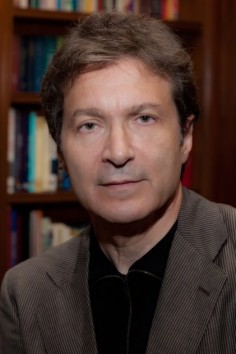 People in the entertainment and media industry know Mr. Haimovitz as an industry leader having managed MGM Networks, Spelling Entertainment, Viacom Inc., and King World Productions, among others. Mr. Haimovitz has 37 years of operating experience. Today he is the Chief Executive Officer at Global Entertainment & Media Holdings Corporation and serves as Special Consultant to the Chairman and Chief Executive Officer at MGM Networks Inc.
People in the entertainment and media industry know Mr. Haimovitz as an industry leader having managed MGM Networks, Spelling Entertainment, Viacom Inc., and King World Productions, among others. Mr. Haimovitz has 37 years of operating experience. Today he is the Chief Executive Officer at Global Entertainment & Media Holdings Corporation and serves as Special Consultant to the Chairman and Chief Executive Officer at MGM Networks Inc.
What people might not know is what a devoted big brother Mr. Haimovitz was to his sister with Down syndrome.
1. You have both of your degrees in mathematics; what got you into the film and television industries?
2. You worked for some of the biggest names and organizations in the business. Whom did you most admire?
3. What lessons have you learned in the media industry that you would pass on to others?
4. Tell us about your sister. What is/was special about her?
5. How did you help make your sister’s life more fulfilling?
6. What is so special about the Be Beautiful Be Yourself Fashion Show?
7. What do you think about Global Down Syndrome Foundation’s work, and how will this help future generations of people with Down syndrome?
San Francisco philanthropist leaves generous bequest
September 8th, 2014 by Global Down Syndrome Foundation
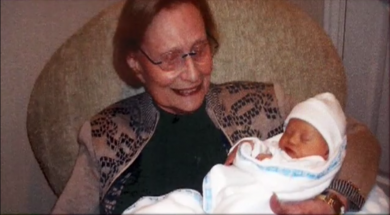
Janice Selix with great-grandson Chase Turner Perry
When Janice Viner Selix passed away peacefully this year at the age of 94, her family wanted to honor her life-long commitment to philanthropy and community. That legacy is now in place through a generous bequest to the Global Down Syndrome Foundation’s medical care and research in celebration of Janice and Alfred Selix’s great-grandson Chase Turner Perry.
The bequest was made with input from Janice and Alfred Selix’s family — daughter Susan & Randy Karsh, and grandchildren Greg Karsh and Casey & Brett Perry. The bequest will support the Shared Family Room at the Anna and John J. Sie Center for Down Syndrome at Children’s Hospital Colorado, fund a grant for Down syndrome and aspiration research, and establish the “Selix Family Down Syndrome and Alzheimer’s Development Fund” at the Linda Crnic Institute for Down Syndrome on the Anschutz Medical Campus.
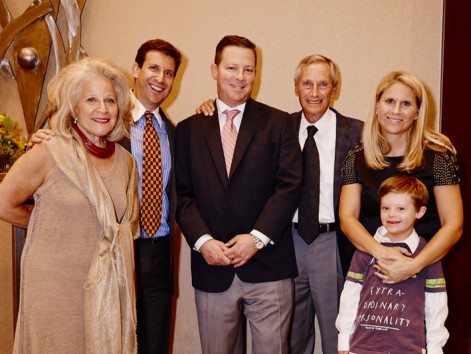
Susan Karsh, Greg Karsh, Brett Perry, Randy Karsh, Casey Perry and Chase Turner Perry
“Mom quietly and generously supported so many students with the opportunity of higher education,” said Alfred and Janice Selix’s daughter Lynn Blankfort of Mill Valley, California. “Her quest to educate has been further extended in recognition of her great-grandson, Chase Perry, the ultimate student whose accomplishments thus far have taught others so much. May this gift continue to educate parents and family members in bettering the lives of those with Down syndrome and Alzheimer’s.”
The Shared Family Room at the Sie Center opened as part of the Sie Center’s new clinical space in 2013 and is intended as a place where clinicians and families can meet in a comforting environment to discuss diagnoses, plans and questions.
The Down Syndrome & Aspiration Research Grant at the Sie Center will fund important study into why children with Down syndrome are more likely to have aspiration problems and what treatments are best suited to helping them thrive. Aspiration research was particularly important to the Karsh and Perry families because of problems that Chase Turner Perry had with aspiration as an infant.
The Selix Family Down Syndrome and Alzheimer’s Development Fund will enable key scientists at the Crnic Institute, including Executive Director Tom Blumenthal, Ph.D., and Director of Alzheimer’s Research Huntington Potter, Ph.D., to go out into the community and spread awareness about the connection between Down syndrome and Alzheimer’s disease.
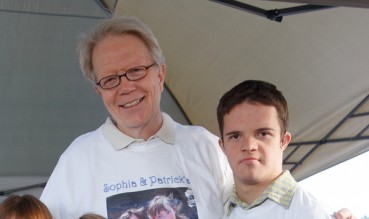
Dr. Huntington Potter
Dr. Potter is the scientist who discovered the mechanistic relationship between Down syndrome and Alzheimer’s and is leading the establishment of an Alzheimer’s research and care center in Colorado. Research into the connection may hold the key to better treatments that would benefit those with Down syndrome and those with Alzheimer’s. Virtually 100% of people with Down syndrome will have the plaques and tangles in the brain associated with Alzheimer’s disease, but only an estimated 50 percent will develop the symptoms associated with Alzheimer’s.
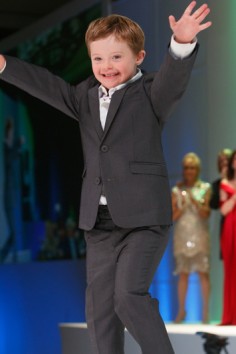
Chase Turner Perry
Janice Selix was born in Stockton, California, and moved to San Francisco at the age of 6, where she lived for the rest of her life. She was known for her warm, gracious, proud, caring and artistic nature, and she continually gave of herself, and generously contributed to those in need. She was preceded in death by her husband, Alfred.
Alfred and Janice Selix’s other daughter, Susan Karsh, and her husband, Randy, are ardent supporters of the Global Down Syndrome Foundation. Susan and Randy Karsh’s grandson, Chase Turner Perry, is a Global Down Syndrome Foundation Ambassador.
The Global Down Syndrome Foundation appreciates the longtime support, advocacy and friendship of the Karsh and Perry families and expresses its profound thanks for the Selix Family bequest and all of the great work it will help fund in support of benefiting the lives of people with Down syndrome.
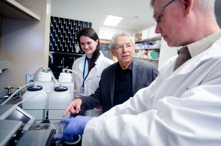 Tom Blumenthal in the lab at the Linda Crnic Institute for Down Syndrome |
Global Briefs Congress on
Critical Down Syndrome Research
Wednesday, September 10, 2014
8:00 am to 9:30 am
Cannon House Office Building Room 122
The Congressional Down Syndrome Briefing Series is co-organized by the Global Down Syndrome Foundation, the National Down Syndrome Congress and the National Down Syndrome Society. This important briefing will focus on global research findings related to Down syndrome, including the link to Alzheimer’s disease, and opportunities for future research efforts.
Among the speakers updating members of Congress about the latest research will be:
- Members of the Congressional Down Syndrome Caucus
- Michelle Livingston, Senior Director of Operations and Government Affairs for the Global Down Syndrome Foundation
- Dr. Thomas Blumenthal, Executive Director, Linda Crnic Institute for Down Syndrome, University of Colorado School of Medicine
- Dr. Huntington Potter, Director of Alzheimer’s Research at the Crnic Institute and the University of Colorado School of Medicine’s Department of Neurology
- Jon Colman, President of the National Down Syndrome Society
- Sara Weir, Vice President of Advocacy and Affiliate Relations for the National Down Syndrome Society
- Susan Goodman, Director of Government Affairs for the National Down Syndrome Congress
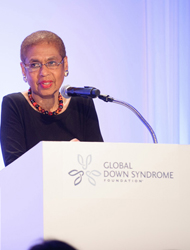
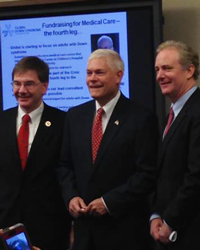
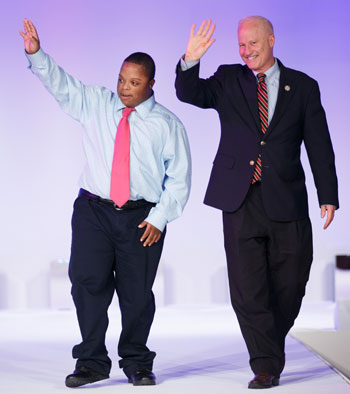
Our Congressional briefing is held in conjunction with the Congressional Down Syndrome Caucus, and Representatives Cathy McMorris Rodgers, Pete Sessions, Chris Van Hollen and Eleanor Holmes Norton
RSVP to Deana Perlmutter at dperlmutter@globaldownsyndrome.org
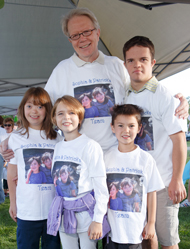 Dr Huntington Potter and Friends |
Dr. Huntington Potter and Alzheimer’s-Down syndrome research
Dr. Potter is the scientist who discovered the mechanistic relationship between Down syndrome and Alzheimer’s disease. Learn more about his groundbreaking research and why studying people with Down syndrome could benefit both people with Down syndrome and people with Alzheimer’s disease.
Global’s Alzheimer’s initiatives
Global is committed to raising awareness and important research funding for Down syndrome and Alzheimer’s disease. Learn more about Global’s Alzheimer’s initiatives.
Infantile Spasms in Children with Down Syndrome: Investigating a Rare but Serious Condition
September 7th, 2014 by Global Down Syndrome Foundation
Infantile spasms can occur in children with Down syndrome and typical children alike. Ongoing research at the Anna and John J. Sie Center for Down Syndrome at Children’s Hospital Colorado examines the relationship between infantile spasms and Down syndrome in hopes of improving diagnosis and treatment.
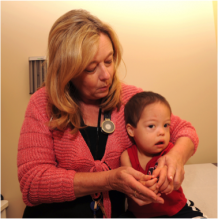 The spasms, characterized by a stiffening of the extremities and an arching or folding at the waist, are also known as West’s syndrome after the first known description of the condition’s symptoms — a letter penned by Dr. W. J. West describing his son’s attacks. Dr. West’s son would heave forward from the waist for a moment, then return to an upright position. These episodes would occur in clusters of as many as 20 spasms in a row in rapid succession.
The spasms, characterized by a stiffening of the extremities and an arching or folding at the waist, are also known as West’s syndrome after the first known description of the condition’s symptoms — a letter penned by Dr. W. J. West describing his son’s attacks. Dr. West’s son would heave forward from the waist for a moment, then return to an upright position. These episodes would occur in clusters of as many as 20 spasms in a row in rapid succession.
While infantile spasms are serious, they are not common. Estimates suggest 1 to 3 percent of children with Down syndrome will develop infantile spasms, while the highest estimate places that figure around 13 percent.
Why So Serious?
Children with infantile spasms stop progressing toward developmental milestones and may lose motor skills they have already mastered, such as sitting up or crawling. They may experience cognitive and speech regression as well.
Unaddressed infantile spasms may permanently impair functionality and impact children’s abilities — a serious concern for children with Down syndrome who may already have developmental delays.
“It is imperative to diagnose infantile spasms early to promote early appropriate treatment and the best possible outcome,” said Dee Daniels, R.N., C.P.N.P., Program Director at the Sie Center.
The Infantile Spasms Research Study


Dee Daniels & Dr. Tim Benke
Currently, the most effective treatments for infantile spasms are pharmaceutical.
“Once, working with children who have Down syndrome and infantile spasms, I noticed that children with Down syndrome were more responsive to treatment, and many times, their infantile spasms resolved quickly,” said Daniels, who was previously a nurse practitioner on the epilepsy team in neurology at Children’s Hospital Colorado. “They also often did not go on to have other seizure types, which was not always the case in typical children who had infantile spasms.”
In the first phase of the Improved Outcome of Infantile Seizures in Down Syndrome Population research project, researchers at the Sie Center are examining the records of 28 patients with Down syndrome and infantile spasms who were cared for at Children’s Hospital Colorado between April 2005 and April 2013. Thus far, researchers have examined the response to various anticonvulsants — including adrenocorticotropic hormone (ACTH) and vigabatrin — to determine their effectiveness.
The research is planned to continue as a 10-year longitudinal study.
“While ACTH treatment for infantile spasms is effective, it can be potentially costly and time consuming. Each type of treatment, ACTH or vigabatrin, has unique side effects,” said Tim Benke, M.D., Ph.D., Director of Research at the Neuroscience Institute at Children’s Hospital Colorado, and Associate Professor of Pediatrics, Neurology, Otolaryngology, and Pharmacology at the University of Colorado School of Medicine. “We want to provide clear information and guidelines for families so they can make informed decisions about what’s right for their children.”
Spotting the Signs
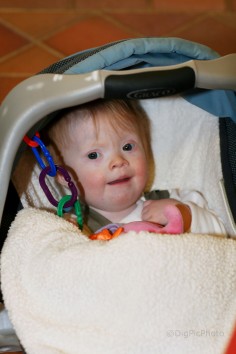 Daniels and Dr. Benke also hope this research will help to increase awareness of infantile spasms in children with Down syndrome, so those who are experiencing this condition will be identified early and treated appropriately to improve their medical and developmental outcomes.
Daniels and Dr. Benke also hope this research will help to increase awareness of infantile spasms in children with Down syndrome, so those who are experiencing this condition will be identified early and treated appropriately to improve their medical and developmental outcomes.
“Sometimes children with Down syndrome who are experiencing infantile spasms are not always recognized early and then treatment is delayed,” Daniels said. “Contributing factors to this missed diagnosis can be that children with Down syndrome already have a range of development delays prior to diagnosis as well as low muscle tone and other medical issues. Subtle early symptoms are often attributed to Down syndrome, hence the diagnosis of infantile spasms is delayed or missed. Raising the awareness of the child’s healthcare providers, parents, and caretakers about the risk and presenting features of infantile spasms in children with Down syndrome is imperative to improving outcomes.”
The Sie Center was founded in 2010 with the support of the Global Down Syndrome Foundation. It serves as a hub of care and research for children with Down syndrome and has the added benefit of being connected to Children’s Hospital Colorado, a top 10 children’s hospital. For more information about the work being done at the Sie Center, visit siecenter.org.
Global hosts screening of “Menschen” film featuring actor with Down syndrome
September 7th, 2014 by Global Down Syndrome Foundation
 |
The Global Down Syndrome Foundation
and the Denver Film Society Present
a Special Screening of “Menschen”
Global Down Syndrome Foundation and the Denver Film Society were pleased to present the Colorado premiere of “Menschen,” a short 30-minute film directed by Colorado’s own Sarah Lotfi, whose own brother and sister were born with Down syndrome and autism, inspiring the character of Radek Novak. The film stars a staunch Global supporter and self-advocate and actor Connor Long.
“MENSCHEN” is the German word for “human beings.” The film challenges prejudice behind stereotypes like “enemy,” “disabled,” or even “hero.”
The screening, at the posh new Sie FilmCenter, included dinner, the movie, and a special Q&A with Long, Lotfi and Producer Anastasia Cumming. Thank you to Three Tomatoes Catering for donating their excellent food for the event!

Story:
May 1945, as the Allies close in, an Austrian captain guides his remnant company behind the Russian lines to surrender to the Americans, taking under their wing a boy with a developmental disability. As the loyalty of his men is brought to the test, a dark secret from the captain’s past comes to light.
About Connor Long:
“Menschen” marks the film debut of Connor Long. Seventeen at the time of production, Connor worked with a dialect coach to speak his German lines in the film. Since filming, he continues his formal education, expanding his personal abilities and opportunities to serve as a role model while finding new challenges and having fun. A regular student in the Colorado Shakespeare Festival, Connor has enjoyed his roles on a variety of projects within the Colorado film and arts community. Connor hopes his work as an actor, athlete, model and advocate will speak plainly as to the inherent value and potential of differently-abled people everywhere. Connor is a regular at Global Down Syndrome Foundation events, and he recently biked with Global’s Dare to Ride Team at the 2014 Courage Classic bike tour in support of the Sie Center for Down Syndrome at Children’s Hospital Colorado.
Director Statement:War is never black and white; there are many perspectives that bring out real color in an adaption. Most people do not put disability and WWII in the same sentence, yet the historical link between them sets the stage for Menschen. I used “Menschen,” the German word for people to convey the dichotomy of what it means to be human regardless of race or disability.
Awards:
Best Actor, Connor Long, Filmstock Film Festival, 2013
Best of Best, Filmstock Film Festival, 2013
Founder’s Award for Excellence, Life Fest Film Festival, 2013
Audience Selection, Best Short Film, Life Fest Film Festival, 2013
Learn more about “Menschen” awards and film festival selections
Upcoming Screenings:
Temecula Valley International Film & Music Festival – Sept. 19-20 – Temecula, CA
Reykjavik International Film Festival – Sept. 28-Oct. 4 – Reykjavik, Iceland
Showcase of Lucerne Film Festival – October – Lucerne, Switzerland
Learn more about screenings of “Menschen”
Alzheimer’s and Down syndrome grant announced!
September 2nd, 2014 by Global Down Syndrome Foundation

Gretchen Josephson
The Global Down Syndrome Foundation is pleased to announce a new grant opportunity from the National Institute of Aging.
The 2 grants totaling $5 million dollars will be awarded in late 2015. The goal of this funding opportunity is to enable the longitudinal progression of Alzheimer’s disease in adults with Down Syndrome using clinical, cognitive, imaging, genetic and biochemical biomarkers.
Global Down Syndrome Foundation is extremely grateful to the National Institutes of Health!
Thanks to all those who have supported Global’s research advocacy in Washington, DC! Together we ARE making a difference!
Alzheimer’s & Down syndrome research by Huntington Potter, PhD
Learn more about the research at the Linda Crnic Institute for Down Syndrome
Read more about the Grant Opportunity here: Grant Request for Proposal(RFP)



 Experience our inspirational and groundbreaking videos and photos. Our children and self-advocates are beautiful AND brilliant!
Experience our inspirational and groundbreaking videos and photos. Our children and self-advocates are beautiful AND brilliant! Make sure your local Representatives are on the Congressional Down Syndrome Task Force.
Make sure your local Representatives are on the Congressional Down Syndrome Task Force.